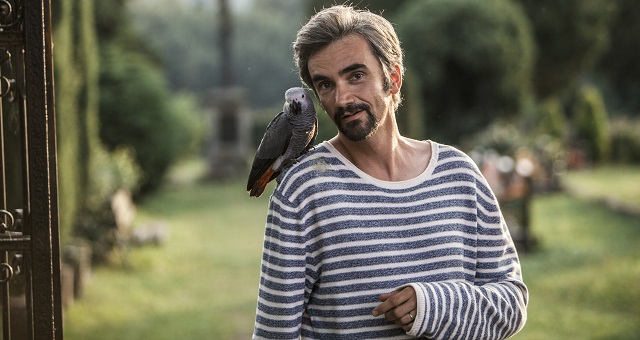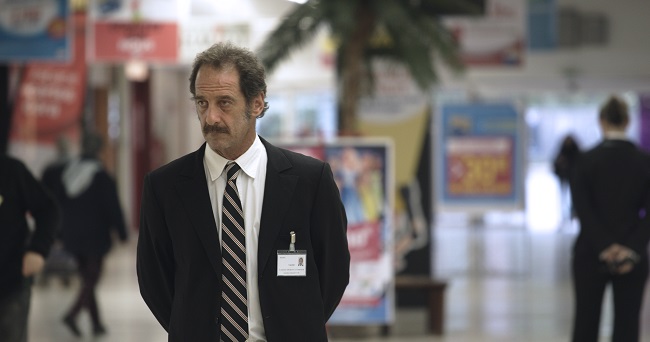The second day of the London Film Festival brought Hollywood glamour to the red carpet with Bryan Cranston, Helen Mirren and John Goodman in town for the European premiere of ‘Trumbo’, a glossy biopic about the screenplay writer who, jailed and blacklisted for refusing to testify in the infamous House Committee of un-American activities during the McCarthy era, later went to win two Oscars for ‘Roman Holiday’ and ‘The Brave One’ under pseudonym. The event also opened its official competition with Cary Fukunaga’s jaw-dropping child soldier film ‘Beast Of No Nation’. Elsewhere, the excellent Czech comedy,’Lost In Munich’ and the Cannes winner French social drama ‘The Measure of a Man’ stood up.
When we first heard about a Dalton Trumbo biopic starring popular’Breaking Bad’ lead Bryan Cranston, we couldn’t help wondering why they chose Jay Roach, better known for Austin Powers and other comic blockbusters, to direct it. Roach and his scribe John McNamara do a good job turning it into an appealing piece of family entertainment.
‘Trumbo’ recreates the glitz of classic Hollywood, as stars such as John Wayne; Edward G Robinson or Kirk Douglas were part of the story, with a cast to match -Helen Mirren’s turn as gossip columnist Hedda Hopper, bullying half of Hollywood around, is worth the price of the admission alone- and a fascinating story told in old-fashioned tone, reminiscent of other recent Hollywood biopics such as ‘Hitchcock’ or ‘Saving Mr. Banks’. But whereas the latter’s meta-reference to Disney perfectly matched the tradition of the studio who made Mary Poppins. The ‘disneyfication’ of Dalton Trumbo’s story, well-meaning as it is, hardly does justice to the facts that shaped one of the darkest, most shameful episodes in the history of American politics; affecting the lives of thousands, ostracised for exercising their their basic right to freedom of thought. ★★★
Better adjusted is the Czech comedy ‘Lost In Munich’, which had its world premiere yesterday. Petr Zelenka had already shown a predilection for absurdist comedy in past works such as ‘Buttoners’, which he refines here through an excellent screenplay spilt by a central twist toying with audience expectations. Its preposterous premise is based around a parrot formerly owned by French president Daladier, present when he met with European leaders in Munich for negotiations that shaped the fate of Czechoslovakia during the Second World War. Still alive and brought to a cultural commemoration by the French Institute, the pet begins repeating anti-Czech sentences allegedly pronounced by its former owner. When a journalist going through a rough patch jumps into the case, the whole thing will blow out of proportion into a full-fledged diplomatic incident.
Shifting genre and format towards mockumentary mode, the film delivers a flow of funny one-liners at a pace that doesn’t give the viewer many gaps to stop laughing. It could have been renamed ‘The co-production that goes wrong’, as everyone involved in the film has to face an interminable string of eventualities. A witty tribute to filmmakers’ much necessary skill for juggling and adapt to constantly changing circumstances, ‘Lost In Munich’ was the first of, hopefully, many LFF’s surprises.
Martin Luther King once said “The ultimate measure of a man is not where he stands in moments of comfort and convenience, but where he stands at times of challenge and controversy”. French director Stéphane Brizé (‘Mademoiselle Chambon’) entered the realm of the Dardennes with ‘The Measure of a Man’, a social drama that earned Vincent Lyndon acting honours at Cannes for his excellent, subdued portrait of a middle aged blue collar worker keeping his dignity afloat after losing his lifetime job in times of employment scarcity.
Lyndon matches with an unshowy turn the natural performances of a mainly non-professional cast. His character, responsible for a wife, a disabled child and a mortgage just a few years short to pay off, faces serious financial trouble while thrown into a labyrinth of nonsensical presentation techniques; useless formation courses and overregulated bureaucracy which is just able to provide lesser-qualified and paid offers. In the meantime, his savings are quickly disappearing and the bank vultures around to cash even further on his misfortune. Finally accepting a position as a security officer in a supermarket, he will further experience first-hand the unfair ways in which our society deals with those more in need. ★★★½


